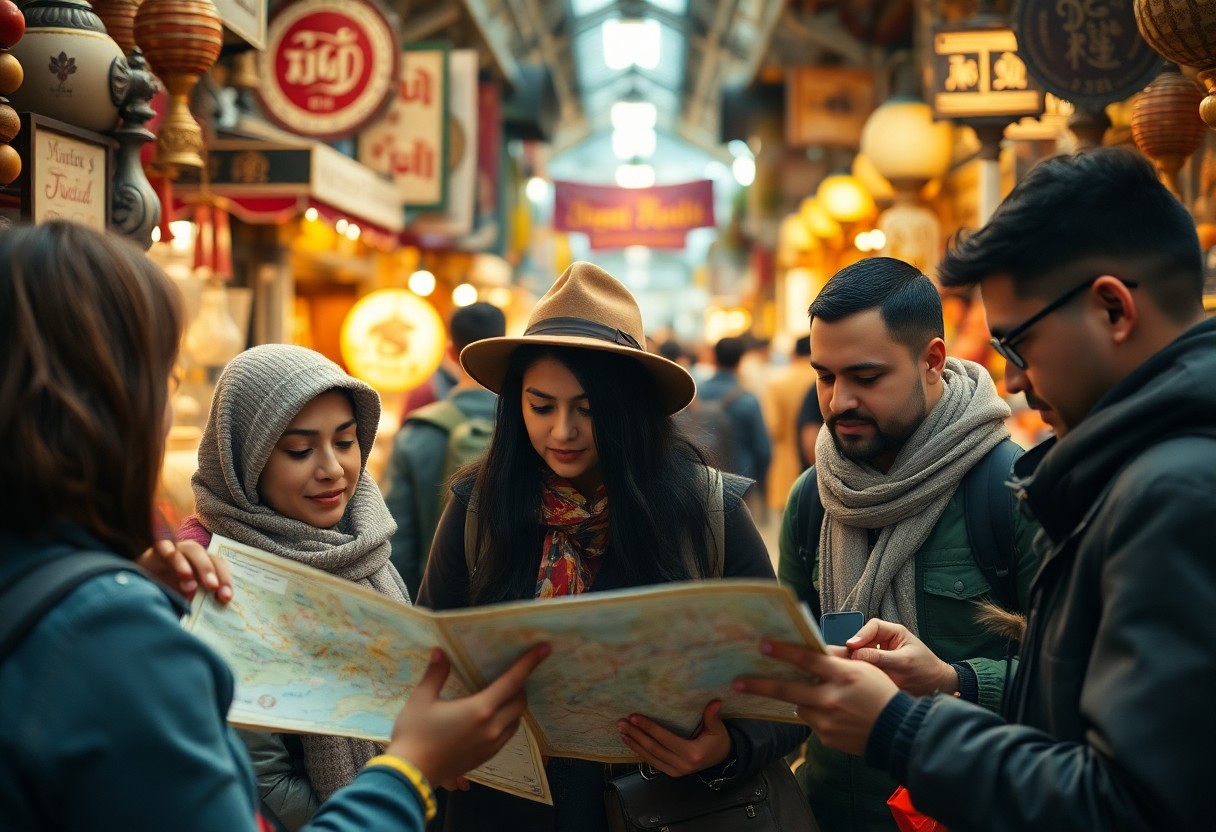Nuances in culture can significantly impact your travel experience, shaping your interactions and understanding of the place you’re visiting. As you commence on your journey, it’s vital to be aware of both positive and negative cultural traits that may affect your engagement with locals. By honing your ability to identify and respect these subtle differences, you’ll foster genuine connections while avoiding misunderstandings that could lead to discomfort. In this guide, you will learn effective strategies for navigating the intricate web of cultural standards abroad, ensuring a rewarding and enjoyable adventure.
Key Takeaways:
- Research cultural practices before traveling to gain insight into local customs and etiquette.
- Observe behaviors around you and adapt your actions to fit in with the local environment.
- Communicate openly and respectfully; ask questions to clarify any misunderstandings and show appreciation for local differences.
Understanding Cultural Nuances
Before you commence on your journey abroad, grasping the concept of cultural nuances is crucial. Every culture possesses its own unique set of values, beliefs, and practices that influence interpersonal interactions. By understanding these subtleties, you can foster respectful communication and build meaningful relationships, helping you navigate the complexities of cross-cultural encounters with ease.
Defining Cultural Nuances
With a multitude of traditions and customs shaping lifestyles around the globe, cultural nuances refer to the intricate subtleties that can affect social interactions and perceptions. These nuances can arise from language, social customs, gestures, and even eating habits, impacting your overall experience and understanding in a foreign environment.
Importance of Cultural Awareness
Nuances in culture can significantly shape your interactions and experiences abroad. A keen understanding of cultural awareness allows you to avoid misunderstandings that could escalate to uncomfortable situations. Recognizing the power of differing norms and values helps you to engage more effectively, creating opportunities for positive exchanges and enriching your experience. By cultivating this awareness, you position yourself to navigate social landscapes with confidence and respect, enhancing both personal growth and connection with others.
Factors Influencing Cultural Dynamics
Some of the significant factors shaping cultural dynamics include:
- Geography
- Religion
- Language
- Economy
- Political Systems
Recognizing these elements can enhance your ability to navigate various cultural landscapes effectively.
Historical Context
There’s no denying that the history of a region significantly influences its current cultural practices and values. Understanding historical events, such as colonization, conflicts, and migrations, can provide important insights into the present-day behavior and attitudes of its people.
Social Structures
Cultural dynamics are often manifested through social structures. These structures are the intricate web of relationships and hierarchies that dictate interactions within a community. They encompass family units, class distinctions, and gender roles, shaping behavior and identity. You may find that these structures vary profoundly across cultures, influencing social norms and expectations.
Structures within social environments can have both positive and negative implications. While they may encourage community support and cohesion, they can also impose limitations and inequalities. Understanding these dynamics allows you to engage thoughtfully with different communities, recognizing that what works in one culture may not be acceptable in another. Maintaining an adaptable mindset can aid in respecting and appreciating the diverse manifestations of human interaction.
How to Approach Cultural Differences
Despite the challenges that come with navigating cultural differences, you can cultivate a deeper understanding and appreciation for the varied perspectives you encounter. Recognizing the importance of respect and openness will enable you to connect more meaningfully with individuals from diverse backgrounds. Adopt a mindset of curiosity and learning, and you’ll find that embracing these differences enriches your experiences abroad.
Active Listening and Observation
How to hone your active listening skills is imperative when engaging with new cultures. You should focus on truly understanding what others are expressing, both verbally and non-verbally. This means maintaining eye contact, nodding in acknowledgment, and avoiding interruptions, which fosters trust and opens up dialogues that go beyond surface-level interactions.
Adapting Communication Styles
For effective interaction in cross-cultural settings, it’s vital that you adapt your communication styles to fit the context. This means being aware of cultural norms regarding formality, non-verbal cues, and indirect versus direct communication. Tailoring your approach can help avoid misunderstandings and create a smoother conversation.
Plus, adjusting your communication styles can significantly enhance your connections with locals. Some cultures may prefer indirect communication, where subtlety is key, while others may value a straightforward approach. Being flexible in how you express yourself allows you to resonate better with your audience. Additionally, understanding the importance of context and tone in conversations can promote positive interactions, ensuring that your intentions are conveyed clearly without unintentionally offending anyone.
Tips for Successful Interactions
After understanding cultural differences, you can enhance your interactions by adopting a few key strategies:
- Be open-minded and willing to learn about new customs.
- Ask questions to clarify misunderstandings.
- Practice active listening to demonstrate engagement.
- Observe how locals communicate to adapt your own style.
- Show appreciation for local cultures through simple acts.
Any effort you make to understand and connect with local customs will foster more meaningful exchanges.
Building Rapport
For successful interactions, focus on establishing rapport with locals. Take the time to share personal stories, ask about their experiences, and express genuine interest in their culture. Being authentic allows for deeper connections, making it easier for you to navigate cultural nuances and create lasting relationships.
Respecting Local Customs
Interactions with locals become smoother when you respect their customs.
Tips to respect local customs include learning about traditions and rituals before you arrive, which shows that you value their culture. Engage in polite behavior by using appropriate greetings and understanding local etiquettes like dress code or dining practices. Avoid discussing sensitive topics such as politics or religion unless prompted, as this can lead to misunderstandings. Additionally, be patient and willing to admit mistakes; locals often appreciate your effort. By approaching your interactions with cultural sensitivity, you foster positive relationships and ensure enriching experiences.
Navigating Conflict and Misunderstandings
Once again, you find yourself in a situation where cultural differences may lead to tension or miscommunication. Understanding the local perspective and acknowledging your own biases can significantly reduce the intensity of conflicts. When misunderstandings arise, approach them with empathy and patience, seeking to comprehend rather than to impose your viewpoint. This helps to foster a more positive dialogue and can turn conflicts into opportunities for greater mutual understanding.
Identifying Potential Pitfalls
Conflict often arises from misinterpretations of cultural norms or expectations. You may inadvertently offend someone with an innocent remark or fail to grasp the significance of a local tradition, which can escalate into a misunderstanding. Be attuned to non-verbal cues and changes in demeanor that signal discomfort or disagreement, and make a conscious effort to inquire and clarify when in doubt.
Strategies for Resolution
If you find yourself in a conflict, the key is to act swiftly and thoughtfully. Open communication is vital; articulate your intentions clearly and seek to understand the other person’s perspective. Active listening, genuine apologies, and a willingness to compromise can often diffuse tense situations. Recognizing that each party holds a piece of the puzzle can facilitate a collaborative resolution.
Navigating these conflicts takes thoughtfulness and awareness. By approaching every misunderstanding as an opportunity for connection, you can foster a sense of trust and respect in your interactions. Take time to listen deeply to the other person’s concerns, validating their feelings even if you disagree. This can transform a potentially negative experience into a meaningful exchange, paving the way for a deeper understanding of the rich cultural tapestry you are engaging with.
Continuous Learning and Adaptation
Keep in mind that cultural fluency requires ongoing effort. Engage in How to navigate cultural differences: 9 tips to enhance your understanding of the local customs and behaviors. By approaching your experiences with an open mind, you create opportunities for deeper connections and a more rewarding journey abroad.
Embracing Flexibility
Assuming that you already know everything about the culture can lead to misunderstandings. Instead, strive to be flexible and adapt to new and unexpected situations. Each country has its nuances, and by remaining open to change, you enhance your ability to navigate through them effectively.
Seeking Feedback
Continuous learning is enhanced when you actively seek feedback from those around you. Engaging with locals and asking for their insights can introduce you to different perspectives. You may discover how your actions are perceived, ensuring that you minimize awkward situations and cultivate positive relationships.
For instance, if you attend a local event, be open to receiving feedback on your participation. You may find that what seems acceptable in your culture can be misinterpreted or even offensive in the local context. By inviting constructive criticism, you not only correct any missteps but also demonstrate your respect for the culture, which can lead to stronger connections and a more enriching experience. Always be willing to learn and adapt based on others’ perspectives.
Final Words
Conclusively, navigating the labyrinth of cultural nuances abroad requires you to stay open-minded and adaptable. Engaging with locals, researching customs, and being aware of nonverbal cues can significantly enhance your experience. By embracing differences and showing respect for various traditions, you not only enrich your understanding but also foster genuine connections. Trust your instincts and don’t hesitate to ask questions, as curiosity often leads to deeper insights into the rich tapestry of culture around you.
Q: What are some effective strategies for understanding cultural nuances in a foreign country?
A: To grasp the cultural nuances of a foreign country effectively, start by researching the local customs and traditions before your visit. Engage with locals, either through conversations or participating in community events, to gain firsthand insights. Observing interactions between locals can help you pick up non-verbal cues and contextual behaviors specific to that culture. Additionally, consider enrolling in workshops or classes that focus on the language and culture to facilitate deeper connections.
Q: How do I approach cultural differences when interacting with locals?
A: When interacting with locals, approach cultural differences with openness and curiosity. It’s beneficial to ask questions if you’re uncertain about certain behaviors or customs. Be mindful of your body language and tone, as these can vary significantly between cultures. Showing respect for their cultural norms, even when they differ from your own, fosters goodwill. If you make a mistake, acknowledge it gracefully and express your willingness to learn from the experience.
Q: What should I do if I unintentionally offend someone due to a cultural misunderstanding?
A: If you unintentionally offend someone because of a cultural misunderstanding, the best course of action is to apologize sincerely. Acknowledge the mistake without being defensive and express your intention to learn from it. Many people appreciate the effort to understand their culture, and your genuine apology can help mend any tension. Use the situation as a learning opportunity to further explore the cultural dynamics at play and how to navigate them in the future.









